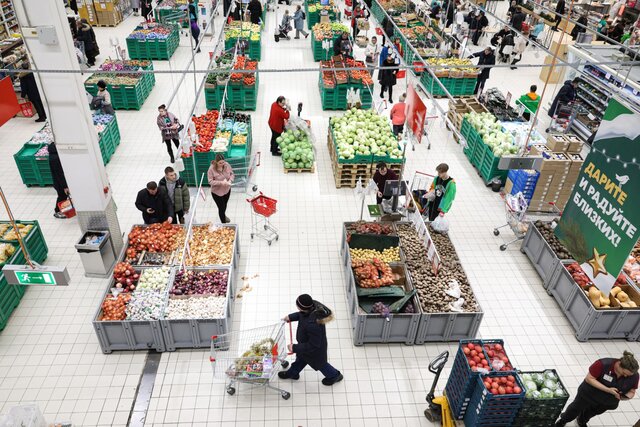‘Life matters more than your wallet’: Meduza takes a look at the Kremlin’s new media guidelines for spinning Russia’s tax hikes
Manage episode 520353374 series 3381925

Russia’s new budget includes tax hikes that the Kremlin knows will anger the public. So the Putin administration has issued detailed instructions to state-run and pro-government media on how to frame the unpopular measures — from pinning the blame on the West to insisting that security and social programs matter more than a bit of personal financial hardship. And, of course, Putin’s name is to be kept out of tax-related coverage. Meduza special correspondent Andrey Pertsev got access to the new guidelines to see how the Kremlin plans to sell the tax increases to the public.
On November 18, Russia’s State Duma passed the 2026 draft budget in its second reading. The plan includes raising the value-added tax (VAT) from 20 to 22 percent and increasing taxes on small and medium-sized businesses. During the same session, lawmakers also approved a “technology fee” that will be charged to importers and manufacturers of household appliances and electronics.
The Kremlin is well aware that these measures are unpopular. Meduza reviewed a set of talking points prepared by the Putin administration for state-run and pro-government media, designed to help them present the new policies in a way that suits the Kremlin.
First, the guidelines instruct journalists to tell audiences that the West is to blame for the tax hikes: Western countries are increasing military spending, the script says, which leaves Russia “forced” to respond in kind. Second, reporters should emphasize that the tax increases will allegedly preserve social benefits and ensure national security. The authors also make clear that the public must not associate any of these unpopular decisions with Vladimir Putin personally — media outlets are strongly advised to avoid mentioning his name in stories about rising taxes.
the new taxes
According to the document, the Kremlin sees the VAT hike as the “most sensitive” measure. Propagandists are told to persuade readers that “a small increase in taxes” is unquestionably better than cuts to social spending.
To bolster the notion that the Russian authorities are acting correctly, the Putin administration recommends citing European countries that are supposedly “slashing social programs to fund weapons.” At the same time, pro-government media should remind audiences about new social and infrastructure projects underway in Russia. “There’s no need to give these up — better to chip in a bit more for security,” the guidelines suggest saying.
The authors also address public concerns that higher taxes will drive up prices. To ease these fears, journalists are directed to say that the tax changes will have only a “minimal” impact on inflation. In addition, the Putin administration urges loyal media to shift attention toward a separate tax increase on bookmakers, portraying it as a “fair” measure.
Meduza is the world’s largest independent Russian news outlet. Every day, we bring you essential coverage from Russia and beyond. Our independence lets us tell the stories others can’t and help you make sense of one of the world’s most enigmatic regions. Explore our reporting here and follow us wherever you get your news.
The document also offers a rhetorical workaround to soften the perception of the tax changes — and even to cast the government as generous. The unpopular measures are now to be described as “the end of the preferential period.” One of the key arguments provided reads:
When times were hard for businesses, the state stepped in to help. But that couldn’t last forever.
At the same time, the guidelines claim the tax increases will affect only 15 percent of companies. They also argue that Russia’s simplified tax regime led some entrepreneurs to split their businesses in order to reduce their tax burden.
A separate section focuses on the new “technology fee” that companies selling imported electronics and appliances will have to pay next year (and that consumers will ultimately bear). Pro-government journalists are instructed to describe the fee as a “forward-looking decision” that will ensure the “continued growth” of Russian technology.
the tech tax
The administration also recommends tailoring explanations of the tax hikes to different audiences. Supporters of the war should be told directly that the revenue will be used “to increase funding for the special military operation.” But journalists are advised not to draw attention to this point when addressing audiences who don’t support the war.
Ultimately, according to the Kremlin, the public should feel a sense of “real danger from the West and Ukraine,” and conclude that increased spending on security is the logical response. To guide readers toward that conclusion, media outlets are encouraged to publish “militaristic statements” from European and NATO leaders. Unlike usual coverage, propagandists are told not to mock these remarks, but instead to underscore “the seriousness of their intentions.”
To achieve the desired effect, the Putin administration even allows propaganda media to “predict” that Russia will face more cross-border strikes and that “[Ukraine’s] sabotage operations will intensify.” The goal, according to the document, is to instill a simple belief in the public: “Life matters more than your wallet.”
Story by Andrey Pertsev
67 episodes



